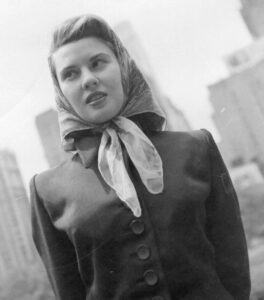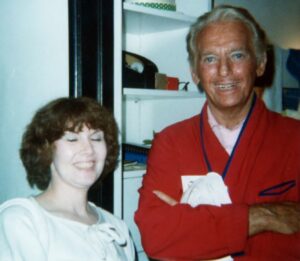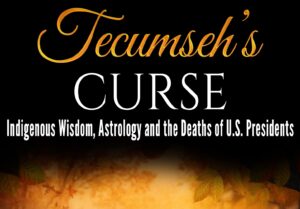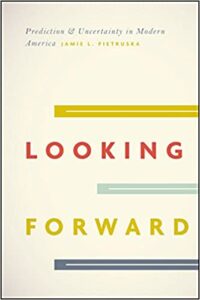My mom, Renée Randolph, was my first astrology teacher. She began studying astrology in the late ‘60s and was immersed in the New Age movement as many metaphysical topics became more easily accessible.
Renée was born in upstate New York and came to the City on her own. With four planets in the 9th house, she worked as a bilingual secretary and later married and raised a family on Long Island. (The photo shows her in Bryant Park when she first came to New York City in 1951.) 
By 1968, she had become somewhat restless and bored, and eagerly accompanied a friend to a local Edgar Cayce “Search for God” study group run by Burt Davis, the brother of the famous psychic’s stenographer. She was delighted to meet so many like-minded people for the first time in her life. As Uranus through her 11th house exactly sextiled her 9th house Sun, and Neptune in the Scorpio closely trined it, she felt her world had opened up.
A few friends from the group became interested in astrology and Renée joined them. They were mothers with young children who found it hard to get away to the City, the only place an astrology teacher could be found. So they devised a plan: one would attend the weekly classes, take copious notes, and later meet with the others to share the lesson. The friends were fortunate to study with Zoltan Mason, who focused on Jean Baptiste Morin’s 17th century technique of astrosynthesis.
Although her chart held a challenging pattern with the notable 1931 Saturn-Uranus-Pluto T-square, Renée’s Sun conjunct Jupiter in the 9th house brightened her life and gave her lucky breaks on many occasions. Her early life had been difficult, but she was a true believer in the transcendent world, and astrology only strengthened her convictions. She was strong minded and pragmatic, with an ironic sense of humor.
Renée was a prodigious reader, who collected many popular astrology books and regularly picked up copies of American Astrology and Dell Horoscope. She read about the afterlife, reincarnation, dreams, ESP and psychic phenomenon, learned meditation, practiced yoga and had some amazing personal experiences with regressions.
While I was initially a skeptic, it wasn’t too long before I became interested in astrology too. I had access to an entire library of books and learned mainly by studying charts and talking about them. Whenever we met someone interesting, we’d get their time or at least their birth date. We’d see what was happening during major life events and speculate on the rising signs of our favorite TV and movie stars.
Renée found it easy to begin doing readings professionally as there was great awareness and interest in the 1970s, though not that many who practiced in our area. She often advised people to wait for stressful aspects to pass before making major decisions.
Renée Randolph wrote a Sun sign column for a Westchester entertainment magazine called 911 for a time, and co-wrote Star Success: An Astrological Guide to Your Career with me in 1991. She also helped me with quite a bit of research for my other Sun sign book, Your Wedding Astrologer.
With Jupiter in Leo, Renée was attracted to celebrities and had a few prominent clients. One was Peter Savage, who co-wrote boxer Jake LaMotta’s memoir, Raging Bull, on which the Oscar-winning de Niro/Scorsese film was based. (Upon being introduced to the bull himself, she jauntily quipped, “Hiya Rocky!” to which he sulkily replied, “I’m Jake.”) She read Douglas Fairbanks, Jr.’s chart and developed an acquaintanceship with the old-time film star in the 1980s. And she coerced talk show host Dick Cavett to get his birth certificate and time after I worked with him in summer stock one year. (The photo shows Renée backstage with Fairbanks in 1978.)
Renée Randolph lived a long and full life and passed peacefully in her sleep in April of 2020 at nearly 89 years old. When she discovered astrology, she felt she had truly found her niche. It enriched her own life and also uplifted and inspired the many who she connected with for decades.
About my Amazon links.


